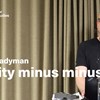enhanced
Completed: Can the implementation of artificial intelligence in the recruitment process enhance the inclusion of disadvantaged groups? A study of Swedish companies
The use of AI in job recruitment is said to make the process both more efficient and less discriminatory. But is this really true? This project will study the effects of using this new tool.
The Reverse Gender Gap in Ethnic Discrimination: Employer Stereotypes of Men and Women with Arabic Names
International Migration Review, s. 1-28. DOI: 10.1111/imre.12170 Abstract We examine differences in the intensity of employer stereotypes of men and women with Arabic names in Sweden by testing how much
The Institute for Futures Studies has been granted financial support from Stiftelsen Riksbankens Jubileumsfond for INAS Conference
In June 2013, the 6th annual conference of the International Network of Analytical Sociologists (INAS) will be held in Stockholm, with the aim to create synergistic contacts between researchers withinThis year, Stiftelsen Riksbankens Jubileumsfond has on April the 11th decided to grant SEK 225,000 to this year's conference that will be hosted by the Institute of Futures Studies in collaboration with the Department of Sociology at Stockholm University. During 7th and 8th of June, both Swedish and international researchers from the world’s leading universities will present their work in the field of analytical sociology. Over forty papers will be presented at the conference, where Thomas Schelling will deliver the opening keynote speech. Schelling was awarded the 2005 Nobel Memorial Prize in Economic Science for having enhanced our understanding of conflict and cooperation through game theory analysis.

Reality minus minus - James Ladyman, Professor of Philosophy
There is plenty of techno-optimistic takes on virtual worlds. They will offer us opportunity for new and exciting experiences, as real as reality, it is said. But what about the costs? In a talk from
Camilla Nothhaft: Lobbying - Systems and People
Camilla Nothhaft is a researcher and lecturer at Lund University, Department of Strategic Communication. ABSTRACT This seminar will present results from a study on how lobbyists and politicians meet in
Rectifying Secondary Climatic Injustices
In: Mosquera, J. & O. Torpman (ed.),Studies on Climate Ethics and Future Generations vol. 6. Working Paper Series 2024:10–17 Abstract Due to faulty planning or unforeseeable contingencies, policies u

Success factors for effective labour market projects
Success factors for effective labour market projects. A comparative study of fifteen Social Fund financed projects.Research report 2014/7, 96 p. For decades, the Swedish municipalities have had a major

New Methods for Sharing Research Findings with Society
Finding new formats for presenting policy-relevant research results.
Rainer Bauböck: Globalization, new technologies and the future of democratic citizenship
Professor of Social and Political Theory, European University Institute. ABSTRACT Liberal democratic citizenship has been shaped by the legacies of Athens (democracy) and Rome (legal rights) but operate between individuals and states. In a Westphalian world, citizenship has both instrumental and identity value. Enhanced opportunities and interests in mobility rights strengthen instrumental interests in multiple citizenship among immigrants, among populations in less developed countries, and among wealthy elites. The latter two trends potentially undermine a genuine link norm and, if they prevail, might replace the Westphalian allocation of citizenship with a global market. New digital technologies create a second challenge to Westphalian citizenship. As has argued, digital identities could provide a global legal persona for all human beings independently of their nationality, and blockchain technologies could enable the formation of non-territorial political communities providing governance services to their members independently of states. Both the instrumental uses of citizenship for geographic mobility and technologies that create substitutes for territorial citizenship are not merely relevant as current trends. They are also advocated and defended normatively as responses to the global injustice of the birthright lottery. I will challenge this idea and argue that liberal democracies should not be conceived as voluntary associations whose membership is freely chosen, but as communities of destiny among people who have been thrown together by history and their circumstances of life. How these foundations of democratic community can be maintained in the context of rising mobility and the digital revolution remains an open question.

Politics of AI & Health: From Snake Oil to Social Good
The potential for AI to improve health and healthcare systems is considerable. However, there is a pressing need to critically engage with the politics of AI and health, and this project will do so from an interdisciplinary perspective.








